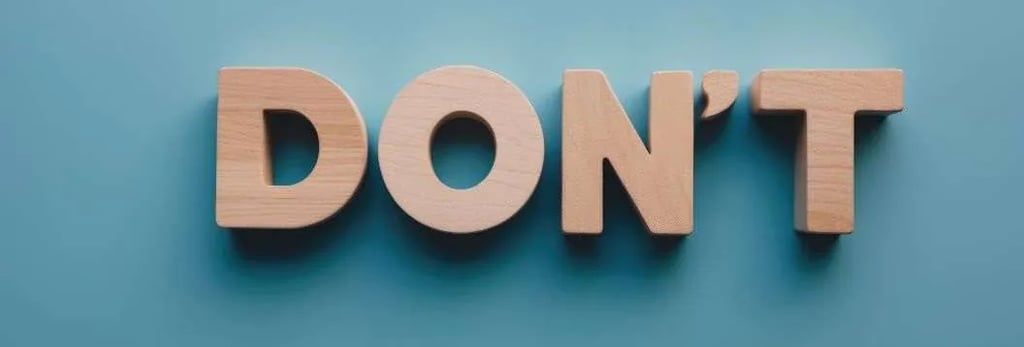WILL
Rayner
8/18/20253 min read


Having a Will ensures that our wishes regarding our Estate are followed up and fulfilled when we die. Whilst the Will provides instructions as to what is to happen to our Estates, whether it is personal items, monies, investments or properties, there are things that you should not include in your Will as it may cause difficulties.
Joint assets
Many people have joint accounts or properties with their spouses, partners, siblings and parents. By nature, joint assets (accounts and properties) will pass automatically to the surviving owner regardless of the relationship between the owners. Therefore, these cannot be distributed to anyone other than the joint owner by an automated built-in mechanism.
Conditions for legacies
Some of us want to make receiving a legacy/gift from our Estate conditional upon encouraging/discouraging certain behaviours. It could be to encourage your grandchildren to finish school or get married to receive a lump sum of money or a fancy car. It does, however, appear that you may want to control their lives too far.
The instructions and wishes expressed in the Will should be straightforward and easy to interpret. Additionally, if the conditions are too restrictive or too ambiguous, there may be legal challenges presented in enforcing the restrictions.
Instead of including conditions in the Will, you may wish to consider expressing your wishes to the executor. It will be treated as a personal suggestion, but enforcing such suggestions may be complicated.
Life assurances & pensions
Life assurances and pensions are subject to separate rules and arrangements, and what happens to the funds held in the policy is usually discussed and established directly with the provider. Most policies require a nomination of a beneficiary directly with the provider, as these take precedence over the instructions in the Will.
Including any of the above in your Will could create potential discrepancies and conflicts, resulting in legal challenges.
Things you do not own
We can only gift the things we own. This may sound obvious. However, the confusion can arise with things such as leased vehicles or rented purchases. Many of us purchased cars on leases or rental purchases, which means that we never own these assets, as these remain the property of the company. Such items will need to be returned to the lease company upon the end of the agreed term or death.
Sometimes, you may benefit from assets that do not belong to you, as these are held in a trust. Being a beneficiary of a trust may appear that you own such an asset, as you benefit from it. As the asset is not yours, you cannot decide to leave such assets in your Will.
Gifts for pets
As much as all pet owners love their pets, it is impossible to leave a legacy to their beloved pets. Despite our love for our pets, the pets are treated as things themselves. You might consider a legally binding arrangement where funds are set aside for the pet’s care. You appoint a trustee to manage the money and a caregiver to look after the pet. Alternatively, you could leave the legacy to a person you trust who will look after your pet and use the legacy for the benefit and maintenance of your pet.
Some animal charities also allow pet owners to leave funds and request care for their pets after they pass away.
Funeral wishes
Some people see the Will as the best place to include his/her funeral wishes and directions. Whilst there is nothing wrong this this approach, checking the Wills is not the first thing to be done. There is usually a time delay before the Will is available and accessed, resulting in not knowing the funeral wishes before organising the funeral. Therefore, it is best to discuss your wishes directly with the family or the executors so that the funeral can be organised as per your wishes. This also allows the wishes to change with time and makes it easier to share these with your family and executors rather than having to update your Wills.
Business interests
Being a business owner requires more careful planning as to the succession of the business on death. The businesses have their own governing rules and documents setting out succession as to who will take over your business or shares. Therefore, the Will will have to be very carefully drafted to correctly reflect wishes as well as to follow the governing documents.
Personal wishes
Sometimes we want to convey messages to people, providing explanations for the legacies left in the Will. However, the Will is not the best place to do so, as the personal wishes are usually unrelated to the distribution of assets.
In addition, the Will becomes a public document once a Grant of Probate is obtained.
If you wish to pass any messages to the people you leave behind, consider doing this by leaving a separate note that can be delivered to the person concerned in a more personal and private manner.
Tania Bowers Law Firm & Associates © 2025. All rights reserved | Privacy Policy
Office
99 Bishopsgate, London EC2M 3XD, United Kingdom
info@tblawfirm.co.uk
Media Inquiry
newsblog@tblawfirm.co.uk
Legal Issues
legal@tblawfirm.co.uk









